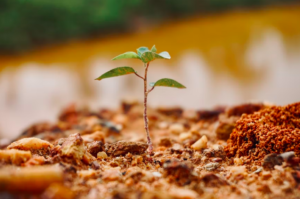Ernest-Marie Mbonda is Professor of Ethics and Political Philosophy at the Universtié des Montagnes (Cameroon), Catholic University of Central Africa (Cameroon) and Université de Moncton (Canada). In this blog, he writes about the rights of future generations. This blog was originally written in French and has been translated by the IF team. You can read the blog in its original French here.

Two problems
The issue of our obligations towards future generations encounters at least two problems: a conceptual problem: how to define the notion of “generation” and how far the future of “future generations” extends; and a normative problem: how to determine whether we have obligations towards future generations, and what would be the nature and content of these obligations.
Here we have a number of equally complex questions in contemporary ethical and political debates on intergenerational justice. The ecological problems which have become an important ethical issue contribute to reviving these questions by targeting future generations in particular.
We propose some philosophical arguments, which we will support with some examples of knowledge and norms drawn from African tradition.
Defining the notion of future generations
Few things are more indeterminate than the notion of a ‘future generation’. According to a “short-termist” approach, the future does not go beyond our descendants who coexist with us: children, grandchildren, and great-grandchildren, knowing that up to four generations are likely to coexist in the same time frame.
According to a long-term approach, the one that dominates in African traditions, the intergenerational chain is much longer and extends to infinity, in an indeterminate and indeterminable future. The intergenerational chain connects its various elements in a certain historical continuity which determines the nature of the relations between these elements by relativizing the notion of proximity or contiguity between the generations.
Therefore, I am no less close to my grandsons and great-grandsons than to my direct sons, even if, in practice, it is primarily in relation to them that I am responsible for a certain number of immediate obligations. I am as obligated towards the grandchildren whom I do not see, whom I may never see (because they are not yet born) as towards those who are already there.
The long-term conception of intergenerational links makes it possible to avoid the impasses in which we get bogged down when we want to determine the exact limits which separate the different generations and their intergenerational obligations.
Determining our obligations to future generations
One of the simplest strategies for determining and justifying our obligations with regard to future generations would consist in positing, within the framework of a ‘rights and duties’ dialectic: that future generations have needs, prerogatives, and rights which depend on us.
Current generations have the responsibility not to deprive future generations of certain endowments, the effectiveness of which depends on them. Each generation has needs and rights that can only be satisfied by other generations in creating claims against them and placing them in the position of debtors.
As for the question of the content of these obligations, they generally boil down to culture (cultural, scientific, moral heritage), goods (economic heritage) and land (environment, climate, etc.) Today, land is one of the most important issues, alongside the question of the climate crisis. In African tradition, this issue comes down to the idea of “the right to live on the land and live off the land”.
The earth as a gift
The earth, with all the riches it contains, is considered to be a gift from God to humans. She provides them with their place of residence and food for subsistence. The right to land, therefore, refers first and foremost to the right to access that without which we would not know where to live, nor how to feed ourselves in order to survive. Land is a res communis, an asset that belongs to the whole community.
Here we are not talking about a “tragedy of the commons”, but about a characteristic that makes it possible to protect the earth from any predatory enterprise. Considering the land as a gift from God compels each generation to preserve it to ensure that future generations can also “live on the land and live off the land”.
Not being the weak link
In the end, it is the vital link uniting the different generations that underpins the strict obligations that generations have towards each other. It is a question for each generation of not breaking the chain and, above all, of not being a weak link.
The position of each generation defines its obligations towards other generations. The content of these obligations is determined by the needs, prerogatives, and rights of each generation, to the extent that our current knowledge of human existence allows us to anticipate – by exercising what the philosopher Hans Jonas called “prospective responsibility”.
Help us to be able to do more
Now that you’ve reached the end of the article, we want to thank you for being interested in IF’s work standing up for younger and future generations. We’re really proud of what we’ve achieved so far. And with your help we can do much more, so please consider helping to make IF more sustainable. You can do so by following this link: Donate
Photo by Syahrin Seth on Unsplash
